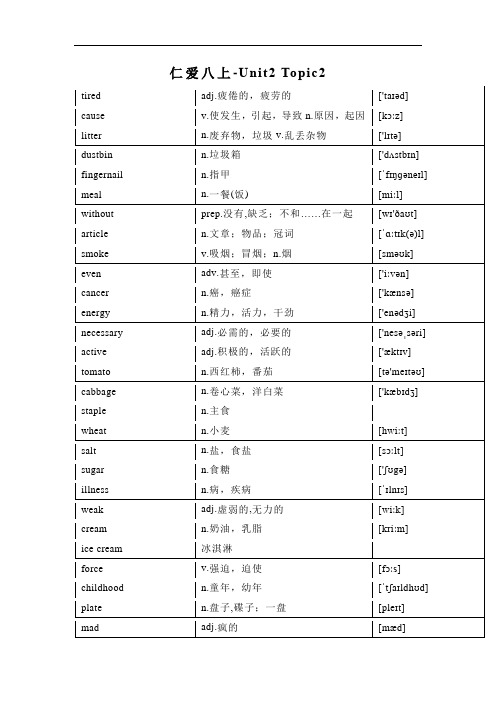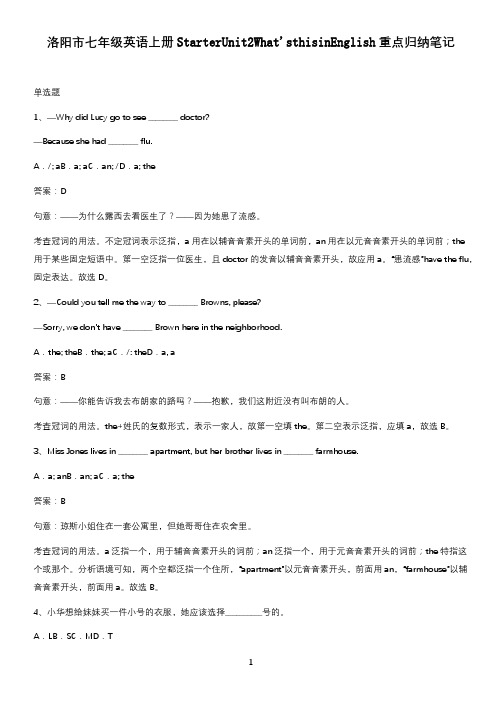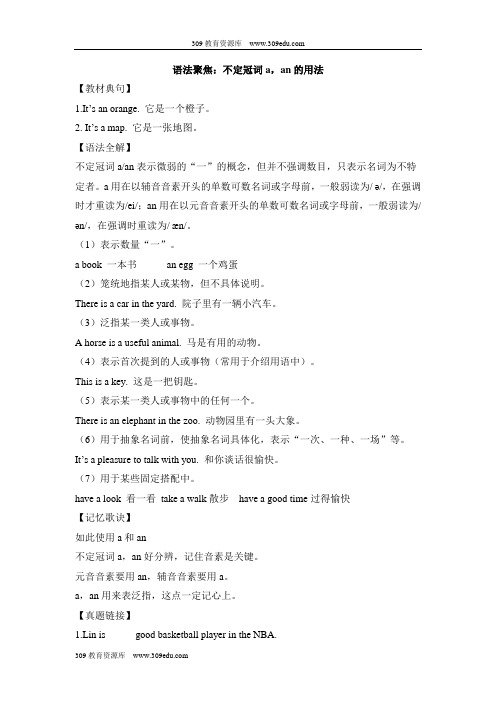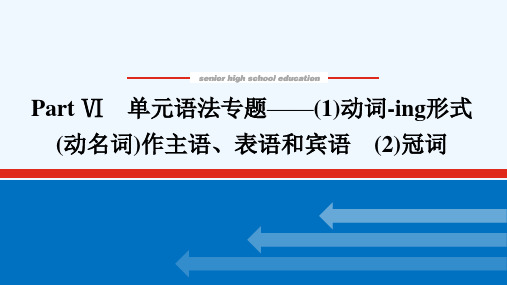unit2冠词
- 格式:ppt
- 大小:126.50 KB
- 文档页数:8

仁爱八上-Unit2 Topic2知识梳理【重点短语】1.stay up late 熬夜到很晚2.do morning exercises 做早操3.throw litter around 到处乱扔垃圾4.read in the sun 在太阳下读书5.in the newspaper在报纸上6.give up doing sth.7.show sth. to sb.=show sb. sth.8.It’s +adj.+ for sb. to do sth.对某人来说做某事……9.be careful not to do sth.小心不要做某事10.force sb. to do sth.迫使某人做某事11.leave for sp. 前往某地12.as soon as…一……就……13.get/be mad 发疯14.be surprised to do sth. 惊奇于做某事15.in fact 事实上16.as soon as possible 尽可能快的【重点句型】1.Staying up late is bad for your health.熬夜到很晚对你的健康有害。
2.I must have a good rest.我一定要好好休息。
3.You’d better not read in the sun.你最好不要在太阳下读书。
4.I must ask him to give up smoking.我一定让他放弃抽烟。
5.He thinks smoking can help him relax.他认为抽烟可以帮他放松。
6.It may even cause cancer.它甚至导致癌症。
7.May I borrow your newspaper and show it to my father? 我可以借你的报纸给我爸爸看看吗?8.How terrible!多么糟糕呀!9.It’s bad for your health.这对你健康有害。

8A Unit 2 知识点提要一、词汇1.广告可n. advertisement ▲(an/-s)2.英国的adj. British3.美国的adj. American4.饼干可n. <英> biscuit (a/-s)、<美> cookie (a/-s)5.卡车可n. <英>*lorry ▲(a/lorries)、<美> truck (a/-s)6.橡皮可n. <英> rubber (a/-s)、<美>eraser ▲(an/-s)7.足球可n. <英> football (a/-s)、<美> *soccer (a/-s)8.假期可n. <英> holiday (a/-s)、<美> vacation (a/-s)9.秋天可n. <英> autumn (a/-s)、<美> fall (a/-s)下落;跌倒;倒塌↓v. fall→三单:-s →▲过去式:fell →▲现分:-ing10.商店可n. <英> shop (a/-s)、<美> store (a/-s)11.院子可n. <英> garden (a/-s)、<美> y ard (a/-s)12.电影可n. <英> film (a/-s)、<美> movie (a/-s)[典型例题]( ) 1. People in the UK say biscuit while people in the USA say ______.A. cakeB.cookieC.eraserD.soccer( ) 2. Which sentence is likely (可能) to be spoken by Americans?A. David Beckham is a popular soccer star.B. The shop sells different kinds of biscuits.C. It doesn’t rain often in this city in autumn.D. The film is very popular.( ) 3. If you are an Englishman, you may say “__________ ”A.I want some cookies.B. Autumn is coming.C. Can I borrow your eraser?D. He often plays soccer with his friends.13.男女混合的,混合的adj. *mixed★一所混合学校a mixed school混合v.8AU4mix →▲三单:-es →过去式:-ed →现分:-ing把A与B混合mix A with B把...混合在一起8AU4mix ... together14.法语不可n. &法国人可n.(a/-s) &法国(人)的adj.8BU4French法国可n. France (a/-s) 常用单数15.外国的adj. foreign (not in or from your own country)外国人可n. foreigner (a/-s)16.语言可n. language (a/-s) (words used in speaking and writing)区分:青少年可n. *teenager (a/-s)17.在…期间prep. during18.讨论,议论v. discuss (talk about something)→▲三单:-es →过去式:-ed →现分:-ing★与某人讨论某事discuss sth. with sb.讨论可n.8BU5 discussion (a/-s)19.在课堂上(短语)in class20.<口>家伙可n. *guy (a/-s)21.<口>好朋友;搭档可n.*buddy ▲(a/buddies)22.主动提出,自愿给予v. offer (give something to someone)→三单:-s →过去式:-ed →现分:-ing★为某人提供某物(2种)offer sth. to sb.= offer sb. sth.★给某人某物(2种)give sth. to sb.= give sb. sth.23.结束v. end →三单:-s →过去式:-ed →现分:-ing终止;末尾;终点可n.7BU8end (a/-s)24.棒球可n. baseball (a/-s)25.赢得;赢,获胜v. win (be best or first in a competition)→三单:-s →▲过去式:won →▲现分:winning获胜者可n. winner (a/-s)26.最少的;最小的adj. (little的最高级) least27.至少,不少于(短语)at least28.至多,不超过(短语)at most29.较远(的)/更远(的) adj.&adv. (far的比较级) farther/further★further常考固搭(5种)进一步学习/研究further study/ research 进一步讨论further discussion更多的信息further information 其他的问题further questions再往前/下走8BU3further on/ down30.最远(的) adj.&adv. (far的最高级) farthest/furthest31.花费(时间或金钱) v. spend →三单:-s →▲过去式:spent →现分:-ing★★★★★“花费”公式(4种)It/事takes/took sb. 时间段to do sth.人spend(s)/spent时间段/金钱on sth.(in) doing sth.人pay(s)/paid(金钱)for sth.物cost(s)/cost sb. 金钱(A.takes; spendsB. takes; costsC. costs; costsD. spends; takes( )2. [基础题]The trip to the zoo _______ us about one hour by underground yesterday.A. paidB. tookC. spentD. cost( )3. [易错题]This dress is too expensive, it ____ me 2000 yuan.A.takesB. spendsC. paysD. costs( )4. [难题]He tries to spend as much time as he can ____ computer games.A. playB. playsC. playingD.to play32.制服可n. *uniform ★(a/-s)穿校服wear a school uniform= wear school uniforms33.国际象棋不可n. chess34.每日的,日常的adj.&日报n. daily35.每周的adj. weekly36.快的adj. quick 比较级:-er 最高级:the -est快地adv. quickly比较级:more ~ 最高级:the most ~慢的adj. slow 比较级:-er 最高级:the -est慢地adv. slowly比较级:more ~ 最高级:the most ~37.自始至终,从头到尾&(内部)穿过7BU6 prep. th r ough区分:though/although prep. 尽管thought v. 认为(think的过去式)38.浏览,快速查看(短语)look through39.真实的,真的adj. real真实地;确实,的确adv. really40.起初,首先(短语)at first41.继续/重复做某事(短语)keep (on) doing sth.[拓展] “继续做某事”(4种)keep (on) doing sth.= continue doing sth.= carry on doing sth. = carry on with sth.42.完成;结束v. finish →▲三单:-es →过去式:-ed →现分:-ing★完成做某事finish doing sth.43.午餐时间不可n. lunchtime★在午餐时间at lunchtime44.物理(学) 不可n. physicsPhysics _______ (be) a useful subject, the student must learn it wisely and well.45.羽毛球运动不可n. *badminton[总结] ★★★常考冠词题play+球类、棋、牌、中国乐器 e.g. play baseball/badminton/chess/cards/erhu(二胡) play the+西洋乐器 e.g. play the piano/violin/guitar/drums(鼓)46.理想的adj. *ideal★一所理想的学校an ideal school区分:想法,主意,思想可n. idea▲(an/-s)二、语言点1.(某人)为什么不做某事Why don’t/doesn’t/didn’t sb do sth. =why not do sth.2.like作动词意为“喜欢”,作介词意为“像”(无时态、人称、数的变化)be like 像;look like 看起来像像做某事be like doing sth.—What is your school life like?—It is like _______ (live) in a big garden.( ). Tom, _____ his brother, _____ playing basketball after school.A.like; likesB. like; likeC. likes; likesD. likes; like3.little “几乎没有”,修饰不可n. a little “有一些”,修饰不可n.few “几乎没有”,修饰可n.复 a few“有一些”,修饰可n.复4.你想要做某事吗?Would you like to do sth. ?肯定回答:Yes, I’d like/love to. 否定回答:I’d like/love to, but……5.做某事玩得开心have a good/great/nice/lovely/wonderful/fantastic time doing sth.有很多much/lots of/a lot of没有have no有更多时间做某事more time to do sth.有更少less有一段some time[典型例题]( )1. —Hey, guys. Do you often have a good time _____ after-school activities?—Of course, we do. And we always have a lot of time_____ soccer.A. to do; to practiseB. doing; to practiseC. to do; practisingD. doing; practising( )2.Amy had a lovely time ____ one place after another in Shanghai and she had much time _____ the city.A. to visit; to enjoyB. visiting; to enjoyC. to visit; enjoyingD. visiting; enjoying( )3.Linda had a great time ____ with her friends, and they also had some time ____ about their studies last weekend.A.to talk; to talkB. to talk; talkingC. talking; to talkD. talking; talking6.练习做某事practice doing sth.( )1. My brother enjoys __________ the piano in the music room.A.practice playingB. practice playC. practicing playingD. practice to play( )2. The two girls always have a good time ________ the piano together.A.practice to play B.to practice to play C.to practice playing D.practicing playing( )3. [难题]We should spend as much time as we can __________ English every day.A. practice speakingB. practice to speakC. on practicing speakingD. practicing speaking7.给某人买某物buy sth. for sb.= buy sb. sth.8.在几年级(2种)in Year/Grade+基数词= in the+序数词+year/gradee.g. 在八年级______________________= ______________________(思考:如果改用阿拉伯数字呢?)9.单个动名词作主语,谓语动词用单数As we all know, using public chopsticks ________ (be) necessary when we eat with others.10.“借”(3种)borrow/borrowed 借入borrow sth. from sb.从某人那借来某物lend/lent 借出lend sth. to sb.= lend sb. sth.把某物借给某人keep/kept 借用keep sth. for+时间段借用某物一段时间How long提问①(for)+时间段①since +时间点①since 从句How soon提问in +时间段How far提问路程①实际距离 e.g.500 metres①s’ walk/ ride /drive /flight(航行) /bus ride /car ride/ train ride①时间段+交通方式e.g. 15 minutes by bus How often提问频率①次数+a+时间单位 e.g. twice a week①every+时间单位 e.g. every day③频度副词7个:always总是、usually通常、often经常、sometimes有时、seldom很少、hardly几乎不、never从不( )1—How far is it from your home to your school? —________.A.On foot B.I can take a bus there C.It’s about half an hour D.About ten minutes’ walk( )2.— How long have you had the bike? — ______ two years. A.in B.until C.since D.for ( )3.— How soon will these waste bottles be recycled?—_________. I have called the recycling company. A.For an hour B.An hour ago C.After an hour D.In an hour( )4.—_________ do you go to the concert? — Always, because I’m interested in it.A.How longB. How soonC. How oftenD. How far( )5. —________ is it from here to your home town? — Well, it takes over three hours to get there by coach. A. How soon B. How much C. How long D. How far( )6.—________do you have after-school activities? —Twice a week.A.How long B.How far C.How often D.How soon( )7. [易错题]—________ do you hear from your parents a week? —At least twice a week.A. How many timesB. How soonC. How oftenD. How long12.一篇由一个美国男孩写的文章an article (written) by a boy from the USA13.the number of…“…的数量”作主语,谓V.用单数;a number of…“许多”作主语,谓V.用复数( ). —A number of volunteers ________ willing to teach in China’s rural areas(农村地区).—Yes, the number of them _______ getting ________.A. is; are; more and moreB. are; is; larger and largerC. is; is; bigger and biggerD. is; are; more and more14.提问数量的句型(2种)What’s the number of the students in your class?=How many students are there in your class?15.seem“似乎”用法(3种)①seem (to be)+adj. ②seem to do sth. ③It seems that+从句16.[难点]need作动词的2种用法若need是情态动词,need do sth. ; 若need是实义动词,need to do sth.解题关键:如何判断need是情态动词还是实义动词?法一:看三单__________________ 法二:看否定__________________ 法三:看提问__________________ ( )1. Millie ______ her homework at the moment.A. needs not finishB. doesn’t need finishC. need not to finishD. doesn’t need to finish( )2. You needn’t ______ those things if you ______ them.A.buy; needn’tB.to buy; don’t needC.buy; don’t needD.to buy; needn’t( )3. —Does he need ______ there at once ? —No, he ______ leave so hurriedly because he has enough time.A. to go; needB. go; needn’tC. to go; needn’tD.go; doesn’t need17.代词it/one(s)的区分:it同类且同物、one(s)同类不同物( ). —The black dress doesn’t look nice on me. I don’t like _____ at all. —How about the blue _____?A.one; one B.it; one C.it; it D.one; it18.Each of(√);every of(×)19.Each of us ________(have) a book. We each ________(have) a book.20.有一个星期的假期have a week off21.★对每科进行一次月考have a monthly test on each subject22.我的日常生活my daily life23.有很多时间参加课外活动have lots of time for after-school activities24.★有一小时的家庭作业have an hour of homework25.★进行一次学校旅行(2种)go on/for a school trip26.★停止做某事(同一件事)stop doing sth. 停下来去做某事(另一件事)stop to do sth. ( )1. We have worked so long. Let’s stop ______ a rest.A.have B.to having C.having D.to have( )2.My father told me a funny joke and I can’t stop ________ every time I think of it.A.to laugh B.laughing C.from laughing D.Laughmore+可n.复/不可n.+than 比…多less+不可n.+than 比…少fewer+可n.复+than 比…少the most+可n.复/不可n.最多the least+不可n.最少the fewest+可n.复最少。

8B Unit2 TravellingⅠ概况Ⅱ详细讲解1.旅游胜地。
本单元的主题是旅游,因此了解一些著名的旅游胜地以及其所在的国家是必要【2020年五中】I will go on a trip to the USA to visit ______ this summer holiday.A. the Sydney Opera HouseB. the Little MermaidC. Tower BridgeD. the Statue of Liberty答案DI miss you so much.21.【2022年树中】—Is anything worth seeing in Nanjing?—Yes. Don’t __________ Zhongshan Mountain National Park with lots of cultural relics and natural beauty.A.forgetB. missC. avoidD. prevent答案BWe’re having a fantastic time here.【2022年十二】10. great fun it is to fly kites! fantastic time the children are having!A. What; What aB. What; WhatC. How; How aD. What a; What【答案】A2.It moved at high speed and was really exciting.(1)speed的基本含义作名词,意思是速度(2)speed的核心考点,考察speed的固定搭配at a/the speed of,以...样的速度,介词用at,speed前用冠词。
而搭配at high speed中没有冠词。
2. The train is running the speed of 200 kilometers per hour.A. withB. atC. inD. for答案B3.We were screaming and laughing through the ride.(1)through的基本含义作介词,意思是从头到尾,自始至终(2)through的核心考点考察through与across、since、for的词义区分。

洛阳市七年级英语上册StarterUnit2What'sthisinEnglish重点归纳笔记单选题1、—Why did Lucy go to see ________ doctor?—Because she had ________ flu.A./; aB.а;аC.an; /D.a; the答案:D句意:——为什么露西去看医生了?——因为她患了流感。
考查冠词的用法。
不定冠词表示泛指,a用在以辅音音素开头的单词前,an用在以元音音素开头的单词前;the用于某些固定短语中。
第一空泛指一位医生,且doctor 的发音以辅音音素开头,故应用a。
“患流感”have the flu,固定表达。
故选D。
2、—Could you tell me the way to ________ Browns, please?—Sorry, we don’t have ________ Brown here in the neighborhood.A.the; theB.the; aC./: theD.a, a答案:B句意:——你能告诉我去布朗家的路吗?——抱歉,我们这附近没有叫布朗的人。
考查冠词的用法。
the+姓氏的复数形式,表示一家人,故第一空填the。
第二空表示泛指,应填a,故选B。
3、Miss Jones lives in ________ apartment, but her brother lives in ________ farmhouse.A.a; anB.an; aC.a; the答案:B句意:琼斯小姐住在一套公寓里,但她哥哥住在农舍里。
考查冠词的用法。
a泛指一个,用于辅音音素开头的词前;an泛指一个,用于元音音素开头的词前;the特指这个或那个。
分析语境可知,两个空都泛指一个住所,“apartment”以元音音素开头,前面用an,“farmhouse”以辅音音素开头,前面用a。
故选B。
4、小华想给妹妹买一件小号的衣服,她应该选择__________号的。

语法聚焦:不定冠词a,an的用法【教材典句】1.It’s an orange. 它是一个橙子。
2. It’s a map. 它是一张地图。
【语法全解】不定冠词a/an表示微弱的“一”的概念,但并不强调数目,只表示名词为不特定者。
a用在以辅音音素开头的单数可数名词或字母前,一般弱读为/ə/,在强调时才重读为/ei/;an用在以元音音素开头的单数可数名词或字母前,一般弱读为/ ən/,在强调时重读为/æn/。
(1)表示数量“一”。
a book 一本书an egg 一个鸡蛋(2)笼统地指某人或某物,但不具体说明。
There is a car in the yard. 院子里有一辆小汽车。
(3)泛指某一类人或事物。
A horse is a useful animal. 马是有用的动物。
(4)表示首次提到的人或事物(常用于介绍用语中)。
This is a key. 这是一把钥匙。
(5)表示某一类人或事物中的任何一个。
There is an elephant in the zoo. 动物园里有一头大象。
(6)用于抽象名词前,使抽象名词具体化,表示“一次、一种、一场”等。
It’s a pleasure to talk with you. 和你谈话很愉快。
(7)用于某些固定搭配中。
have a look 看一看take a walk散步have a good time过得愉快【记忆歌诀】如此使用a和an不定冠词a,an好分辨,记住音素是关键。
元音音素要用an,辅音音素要用a。
a,an用来表泛指,这点一定记心上。
【真题链接】1.Lin is _____ good basketball player in the NBA.A. aB. anC. theD. /解析:句意:林(书豪)是NBA里的一名不错的篮球运动员。
表示“一”的概念,用不定冠词a或an,排除C、D两项;good以辅音音素开头,所以用不定冠词a。

Grammar ——冠词语法图解探究发现①My trip to Tibet was really an unforgettable experience.②His mother's sudden death came to him as a shock.③This watch is an18th century watch, which has been passed down from my great grandpa.④This lab used to be in the charge of Mr Wang.⑤I like / music, especially the music of the film.[我的发现] 冠词用于表示类别,不定冠词表示泛指;元音因素前用an ,辅音因素前用a;定冠词表示特指;不可数名词前或固定搭配中用零冠词。
一、不定冠词a/an的基本用法不定冠词a/an使用场合例句具有泛指的概念,表示“一类”或“其中的一个”In my opinion, to take a tenminute break between classe s is necessary. Otherwise we will feel tired both physically and mentally.在我看来,课间休息十分钟是必要的。
否则我们会在心理和身体上都感到疲惫。
初次提到某人或某物Last week our class organized an activity to thank our teachers before graduation.上周我们班在毕业前组织了一次活动去感谢我们的老师。
在速度、比率、价格等前面You can buy secondhand books at a low price in one of our①Would you like a coffee or a tea?②He has a good knowledge of chemistry.③No matter how tough the task is, there is no doubt that we will ove rcome all the difficulties and win a complete success.④A Mr Smith wishes to speak to you.⑤The two boys are of an age.⑥ Maths was too difficult a subject for me, so I chose to learn liberal arts.⑦A number of students took part in the voluntary activity yesterday.二、定冠词the的主要用法①England and France are connected by the English Channel. 英吉利海峡连接英法两国。
【课堂笔记】人教版七年级英语上册Unit2基础识记1.your father and mother 你的爸爸和妈妈2.an uncle/aunt 一位叔叔/阿姨3.his aunts and uncles 他的阿姨和叔叔们4.my four fris 我的四个朋友5.her parents 她的父母6.my family tree 我的家谱7.your brother/sister 你的兄弟/姐妹.these two girls 这两个女孩9.in the first picture 在第一张图片里10.in the next picture 在下一张图片里11.have a good day 过得愉快12.my family photo 我的全家福13.a photo of my family 我家人的一张照片14.her cousin 她的表兄15.the name of my dog 我的狗的名字16.in my family 在我的家庭里17.two photos/pictures 两张照片1.my grandparents 我的祖父母重点句型1.This is my fri, Jane. 这是我的朋友,简。
2.These are my brothers. 这些是我的兄弟们。
3.Those are my parents. 那些是我的父母。
4.That is my family. 那是我的全家。
5.—Are these/those your parents?这些/那些是你的父母吗?—Yes, they are. 是的,他们是。
6.—Who's he? 他是谁?—He's my brother, Paul.他是我的兄弟,保罗。
7.—Who're they? 他们是谁?—They're my grandparents.他们是我的(外)祖父母。
.Here are two nice photos of my family.这是我家的两张好看的全家福。
人教新目标英语七年级上册Unit 2 This is my sister知识整理重点词汇grandfather称祖父,grandmother叫祖母,father父mother母,brother兄弟来称呼,sister姐或妹,parent父或母,uncle伯、舅、叔,aunt姨、婶、姑,daughter女儿son儿子,friend 朋友、友人picture 不仅指照片,也可指画,画像,图片等单元生词“秀”尊敬长辈是美德,儿(son)女(daughter)共唱幸福歌,parents包括mother and father,grandparent只指grandfather 或grandmother一个。
兄弟(brother)姐妹(sister)很快乐,堂兄们(cousin)也不错,拍张照片(picture,photo)在这里(here),叔叔(uncle)、婶子(aunt)笑呵呵。
he(他)的本领确实大,前加“s” 变成“她(she)”。
这些(these)那些(those)一字差,亲爱的(dear)朋友(friend)是(are)一家。
重点句型This is /That i s…….Are those your ... ?This/That is…These/Those are…交际用语Who is he/she?He/she is…Nice to meet you.Nice to meet you,too.Thanks.Bye!This/That is my…Who is she/he?Who are they?重要语法代词【课文讲解】1. This is my sister. 这是我的姐妹。
1) 当我们把一个人介绍给另一个人时,常用句型T his is…意为“这是……”。
如果介绍距离我们较远的人时,则用That is…或That’s…意为“那是”,一般不用He is… 或she is…。
一般来说,从交际习惯上来看,先把年轻人介绍给长者;在宾主之间,先介绍宾客;男女之间,先把男士介绍给女士。
Unit 2 Last weekend一、单词clean打扫-- cleaned(clean 的过去式)打扫stay停留-- stayed (stay的过去式)停留wash洗—— washed 洗watch看——watched看have患病——had 患病sleep 睡觉——slept睡觉read读——read 读see 看见——saw看见last 上一个的yesterday 昨天before在…之前二、短语clean my room 打扫我的房间wash my clothes 洗衣服stay at home 呆在家里watch TV 看电视go boating 划船read a book 读书see a film 看电影have a cold 感冒sleep 睡觉(过去式slept)climb a mountain 爬山cooked dinner做饭cook noodles 面条三、句子1. How was your weekend?你周末过得怎么样?2. It was good/fine/OK,thank you.很好,谢谢!3. What did you do last weekend?你上个周末干了什么?4.I stayed at home with your grandma.我和你奶奶呆在家里.(with和谁)5. Did you do anything else?你还做了其他什么事吗?6. Yes,I cleaned my room and washed my clothes.是的,我扫了房间,还洗了衣服。
7.I want to buy the new film magazine.我想买期新的电影杂志。
8.Did you see a film?你看电影了吗?No,I didn’t .I had a cold. I stayed at home all weekend and slept.没有,我感冒了。